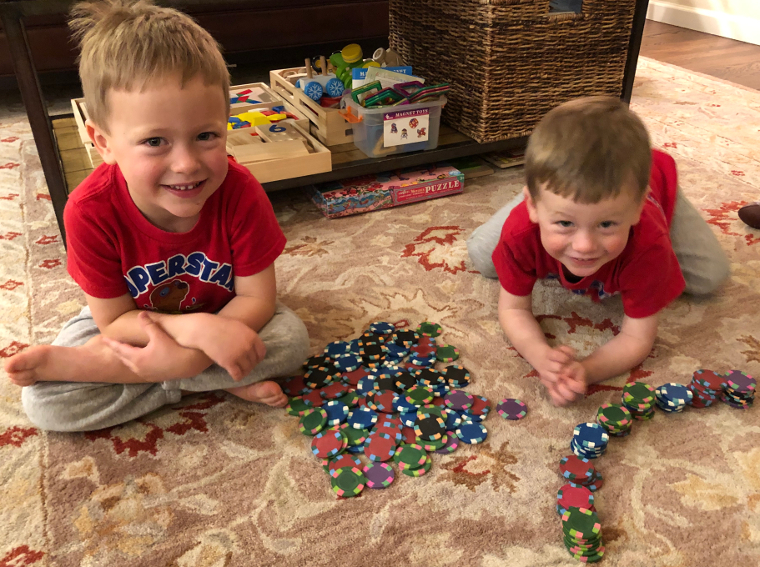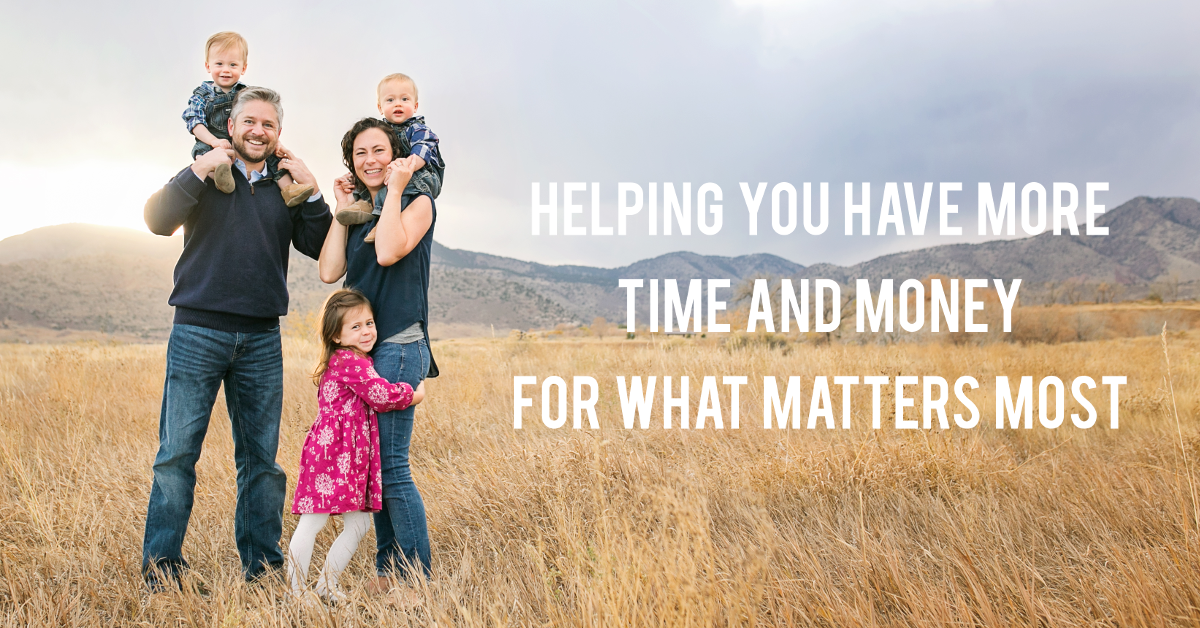In my previous post I told the story of the day I lost the most money at the poker tables and the lesson it taught me. Fortunately, not every life-lesson I’ve learned playing poker has come at such cost.

Can you guess, based solely on how they stack their chips, which of my sons plays looser and which tighter? 🙂
In this final post of this three-part series, I share the last three lessons a decade of poker has taught me, including the single biggest lesson I’ve learned.
Lessons 6-8
6. Don’t Lose Sight of What Matters More
On the surface, playing poker is about winning money. And I’m glad my time thus far at the tables has shown a profit rather than a loss.
But let’s be honest. The $2,114 I’ve earned is absolutely not worth the time I’ve spent from an ROI perspective. I doubt I’ve made more than $2/hour! If earning money were the only goal, I should have spent the time in more lucrative pursuits.
But it’s been worth it from more important perspectives:
- It has been a great intellectual challenge, and I’ve loved learning.
- It has taught me or reinforced for me the other life lessons mentioned in this series of posts.
- And, significantly, because most of the games I’ve played have been home games, I’ve reconnected with old friends, made new friends, and deepened my relationships with current friends and coworkers.
Many activities in life involve multiple goods (e.g., winning, learning, developing friendships). When that’s the case, it’s important not to lose sight of what matters more. (And, hint, the goods that matter more are usually not the most flashy.)
For a student, for instance, getting high marks is great. But learning is a greater good. For a parent, providing financially for your children is great. But once basic needs have been met, spending time with them is usually a greater good.
7. You’ve Gotta Know When to Hold’em, Know When to Fold’em….
About 25 years before I started playing poker, when I was just a little boy, Kenny Rogers’ song “The Gambler” came out. My parents tell me it was my favorite song. Go figure.
For readers with fewer gray hairs than I have, the refrain of that famous song goes:
You’ve got to know when to hold’em. Know when to fold’em. Know when to walk away. And know when to run. You never count your money when you’re sittin’ at the table. There’ll be time enough for countin’ when the dealin’s done.
Rogers’ refrain is about more than cards. It’s about prudence. Prudence is the virtue that indicates which course of action to take to achieve the good in any set of concrete circumstances.
In poker, dozens of factors, which constantly change, make up the concrete circumstances in which you find yourself: The value of your cards. Your position at the table. The size of your chip stack relative to the size of the chip stacks of other players and the size of the blinds. The action in the hand that has occurred in front of you. The action that you anticipate will occur after you act. Your impression of other players. The impression you think they have of you. Etc., etc.
Amid such richly textured, ever-changing circumstances, you must act. And those actions—holden’em, folded’em, etc.—determine your success as a poker player. Sure, luck is always a factor. But over time, the concrete actions you take as you apply general principles of good play to thousands of unique circumstances will determine your success.
Life Application
Life is just this way. As in poker, there is no playbook specifying what you should do in every concrete circumstance. On a Saturday morning, should you spend time catching up on sleep, exercising, or getting chores done around the house? Should you rent a better apartment or spend that money on further education? Should you support this cause or that cause?
As in poker, so in life there are general principles (e.g., love one another), and you have to apply those principles as best you can to the concrete circumstances of life. The best way to improve in poker is to learn from the pros by reading what they teach, observing what they do, and doing likewise. The best way to improve in life is, similarly, to learn from and imitate life’s heroes.
To be a successful poker player, you’ve gotta know when to hold’em, know when to fold’em. But to be successful more broadly speaking, you also have to know when to walk away, know when to run.
8. Play the Hand You’re Dealt
The single biggest life-lesson poker has taught me is to play the hand you’re dealt.
At first blush, that’s sort of a no-brainer. What else can you do?
But that is an attitude of resignation. It’s not what I mean.
No. Playing the hand you’re dealt—really playing it—means not getting frustrated when it’s a bad hand (much less the 31st bad hand in a row). It means not complaining. I get frustrated, and I complain, in poker and in life. But here is precisely how often I reckon doing so has ever helped me: never.
Playing the hand you’re dealt means actively embracing what you’ve been given and making the absolute most out of it you can. Even something as absolutely awful as the loss of a child, which my family has suffered, can bring about some good.
Sometimes in life you’re dealt the equivalent of pocket aces. But often you’re dealt a sub-par hand. You break a bone. A situation at work is tough. Or a dating relationship ends badly. Even in very difficult situations, though, there are positive ways forward. And because it’s rare to be dealt great hands in life as in poker, how you play the non-great hands will make a disproportionately large difference.
Playing the hand you’re dealt isn’t always easy, but it’s the best way to play. It means taking what you’ve been given, doing your level best, and letting the chips fall where they may.
—–
Question: The 8 life-lessons a decade of poker has taught me involve: (1) patience, (2) acting when the moment is right, (3) perseverance, (4) not letting your emotions control you, (5) fearing not, (6) not losing sight of what matters more, (7) prudence, and (8) playing the hand you’re dealt. Do any of these lessons resonate with your experience? You can leave a comment by clicking here.
If you liked this post, why not join the 5,000+ subscribers who receive blog updates on how to have more time and money for what matters most? Sign up here.

Powerful message man God bless you and your family my brother. Salute